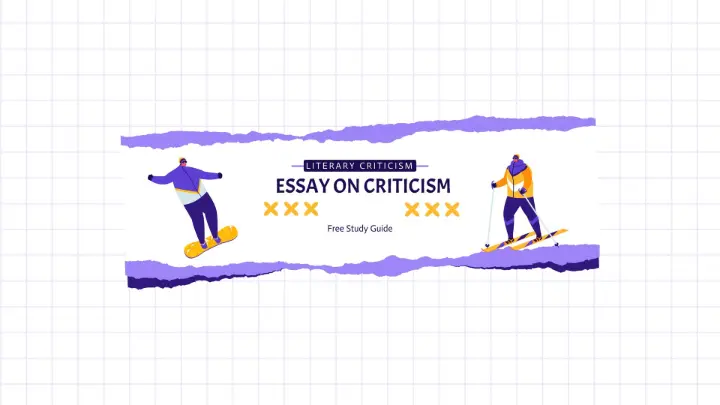📖 Why You Should Download Our Free eBook?
✅ 100% Free – No hidden costs, just pure value!
✅ Expert Insights – Learn from industry professionals.
✅ Time-Saving Tips – Practical strategies you can apply immediately.
✅ Step-by-Step Guide – Easy-to-follow instructions for beginners and experts alike.
✅ Boost Your Knowledge – Stay ahead with the latest trends and information.
✅ Actionable Strategies – Proven techniques to achieve better results.
✅ Exclusive Content – Get insights not available anywhere else.
✅ Instant Access – Download now and start reading in minutes.
Rs: 99 Free
The verse "essay" was not an uncommon form in the eighteenth-century poetry, deriving ultimately from classical forebears including Horace's Ars Poetica and Lucretius' De rerum Natura. Throughout the poem, Pope refers to ancient writers such as Virgil, Homer, Aristotle, Horace and Longinus. This is a testament to his belief that the "Imitation of the ancients" is the ultimate standard for taste. Pope also says, "True Ease in Writing comes from Art, not Chance, / as those move easiest who have learn'd to dance" (362–363), meaning poets are made, not born. As is usual in Pope's poems, the essay concludes with a reference to Pope himself. William Walsh, the last of the critics mentioned, was a mentor and friend of Pope who had died in 1708. This is in reference to the spring in the Pierian Mountains in Macedonia, sacred to the Muses. The first line of this couplet is often misquoted as "a little knowledge is a dangerous thing".
An Essay on Criticism was famously and fiercely attacked by John Dennis, who is mentioned mockingly in the work. Consequently, Dennis also appears in Pope's later satire, The Dunciad. This work of literary criticism borrowed from the writers of the Augustan Age. The poem received much attention and brought Pope a wider circle of friends, notably Joseph Addison and Richard Steele, who were then collaborating on The Spectator. The first of the poem’s three sections opens with the argument that good taste derives from Nature and that critics should imitate the ancient rules established by classical writers. The second section lists the many ways in which critics have deviated from these rules. In this part, Pope stressed the importance of onomatopoeia in prosody, suggesting that the movement of sound and metre should represent the actions they carry. The final section, which discusses the characteristics of a good critic, concludes with a short history of literary criticism and a catalogue of famous critics. Alexander Pope's "An Essay on Criticism" seeks to lay down rules of good taste in poetry criticism, and in poetry itself. Structured as an essay in rhyming verse, it offers advice to the aspiring critic while satirizing amateurish criticism and poetry.
Joseph Addison, who considered the poem ‘a Master-piece’, declared that its tone was conversational and its lack of order was not problematic: ‘The Observations follow one another like those in Horace’s Art of Poetry, without that Methodical Regularity which would have been requisite in a Prose Author’ (Barnard 1973: 78).
About Poet: Alexander Pope, this eminent English poet was born in London, May 21, 1688. His parents were Roman Catholics. In this, famous villa Pope was visited by the most celebrated wits, statesmen and beauties of the day, himself being the most popular and successful poet of his age. His pastorals and some translations appeared in 1709, but were written three or four years earlier. These were followed by the Essay on Criticism, 1711; Rape of the Lock (when completed, the most graceful, airy, and imaginative of his works), 1712-1714; Windsor Forest, 1713; Temple of Fame, 1715. In a collection of his works printed in 1717, he included the Epistle of Eloisa and Elegy on an Unfortunate Lady, two poems inimitable for pathetic beauty and finished melodious versification. From 1715 till 1726, Pope was chiefly engaged on his translations of the Iliad and Odyssey, which, though wanting in time Homeric simplicity, naturalness, and grandeur, are splendid poems.
In 1728-29, he published his greatest satire—the Dunciad. In 1737, he gave to the world a volume of his Literary Correspondence, containing some pleasant gossip and observations. A fourth book to the Dunciad, containing many beautiful and striking lines and a general revision of his works, closed the poet's literary cares and toils. He died on the 30th of May, 1744, and was buried in the church at Twickenham. He was, as his friend Lord Chesterfield said, "the most irritable of all the genus irritabile vatum, offended with trifles and never forgetting or forgiving them." He died at Chiswick, in 1717. Nonetheless, though Pope’s oppositions divide, they also keep within a single framework different categories of writing: Pope often seems to be addressing poets as much as critics. Alexander Pope, the master of the heroic couplet and a key tastemaker of the Augustan age, was a central figure in the Neoclassical movement of the early 18th century. He perfected the rhymed couplet form popularized by his idol, John Dryden, and adeptly used it for satiric and philosophical purposes. His mock epic, “The Rape of the Lock” (1714), cleverly critiques the elite society of his time.


